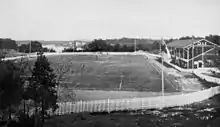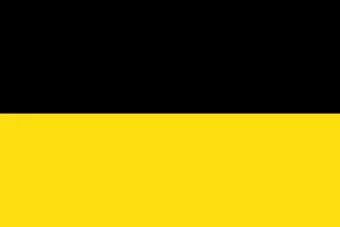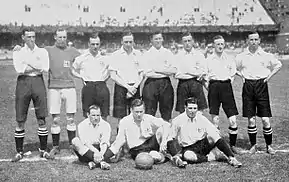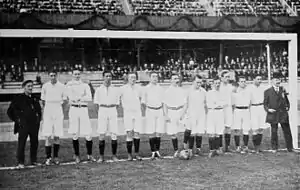Football at the 1912 Summer Olympics
Football at the 1912 Summer Olympics was one of the 102 events at the 1912 Summer Olympics in Stockholm, Sweden.[1] It was the fourth time that football was on the Olympic schedule. The tournament was contested between 11 nations, all of them from Europe, with Great Britain[2] winning the gold medals (the IOC accredits Great Britain and Ireland with the medal). Replicating the 1908 tournament, Denmark won silver medals and the Netherlands won bronze medals.[3][4]
 Illustration from the Official Report | |
| Tournament details | |
|---|---|
| Host country | Sweden |
| Dates | 29 June – 4 July |
| Teams | 11 |
| Venue(s) | 3 (in 1 host city) |
| Final positions | |
| Champions | |
| Runners-up | |
| Third place | |
| Fourth place | |
| Tournament statistics | |
| Matches played | 11 |
| Goals scored | 93 (8.45 per match) |
| Top scorer(s) | |
| Football at the 1912 Summer Olympics | |
|---|---|
 | |
| men | |
Just as the Football Association had organised the 1908 Olympic football competition in London, the Swedish Football Association ran the 1912 event.
The games took place in three different stadiums from June 29 to July 5, 1912. From the eleven games of the main tournament, two were played at Tranebergs Idrottsplats in a suburb of Stockholm, five games including the bronze medal match took place at Råsunda Idrottsplats also outside Stockholm, while four games including the final were held at the Olympiastadion.
Venues
| Stockholm | ||
|---|---|---|
| Stockholm Olympic Stadium |
| |
| Capacity: 33,000 | ||
 | ||
| Råsunda IP | ||
| Capacity: — | ||
 | ||
| Tranebergs Idrottsplats | ||
| Capacity: — | ||
 | ||
Participants
The tournament attracted a record 11 entries, all of them from Europe: The Football Association entered a Great Britain national amateur team to represent the United Kingdom (Great Britain and Northern Ireland).
France and Belgium also entered, but they withdrew shortly before the draw was made, while the entry of Bohemia was rejected, as only nations or associations affiliated to FIFA were allowed to enter the competition.
A total of 135+28 footballers from 11 nations competed at the Stockholm Games:[note 1]
 Austria (11+4)
Austria (11+4) Denmark (15)
Denmark (15) Grand Duchy of Finland (13)
Grand Duchy of Finland (13).svg.png.webp) Germany (11+11)
Germany (11+11) Great Britain (14) (Great Britain)
Great Britain (14) (Great Britain).svg.png.webp) Hungary (11+3)
Hungary (11+3).svg.png.webp) Italy (12+2)
Italy (12+2) Netherlands (15)
Netherlands (15) Norway (11+1)
Norway (11+1) Russian Empire (11+4)
Russian Empire (11+4) Sweden (11+3)
Sweden (11+3)
Course of the tournament
In the first round of the tournament, the hosts from Sweden went out in the opening match against the Netherlands. Fighting back from a 1-3 deficit with half an hour to go, Sweden only lost 4-3 on a goal scored by Dutch player Jan Vos in the extra time of the English referee. At Tranebergs Idrottsplats, Austrian football pioneer Hugo Meisl was the referee as Finland beat Italy also in extra time.
In the second round, Finland won again, this time beating Russia, who had received a bye in the first round. By this stage, the Great Britain team entered the contest, drawn to play against Hungary at Olympiastadion. Great Britain was captained by Vivian Woodward, a record-scoring centre-forward from Chelsea, who had formed part of Great Britain's gold medal winning side of the 1908 Summer Olympics. Led by forward Harold Walden, who scored six goals, Great Britain defeated Hungary with 7-0.
In the semi-final round, Walden scored all four goals, as Great Britain defeated Finland 4-0. In the other semi-final Denmark beat the Netherlands 4-1; the Dutch consolation goal put behind goalkeeper Sophus Hansen by Danish defender Harald Hansen. For the second successive time, the final would pair Great Britain with Denmark, and like in 1908, the team representing Great Britain would win gold medals, although this game would be closer than the 4-2 score-line suggested. With no rule allowing substitutions, Denmark played with one player less from the 30th minute of the game, when Charles Buchwald was injured.
A consolation tournament run, conjunctively, with the tournament proper paired the losers of the first and second rounds, and was eventually won by Hungary,[5] although no medals were awarded for the top three finishers.[3]
German player Gottfried Fuchs equalled the record for most goals in an international (set by Dane Sophus Nielsen in the 1908 Olympics) with 10 goals for Germany against Russia, a record that stood until 2001.
Bracket
| First round | Second round | Semi-finals | Final | |||||||||||
| | ||||||||||||||
| June 30 - Olympiastadion | ||||||||||||||
| bye | ||||||||||||||
| | 7 | |||||||||||||
| | 0 | |||||||||||||
| | ||||||||||||||
| July 2 - Olympiastadion | ||||||||||||||
| bye | ||||||||||||||
| | 4 | |||||||||||||
| June 29 - Tranebergs Idrottsplats | ||||||||||||||
| | 0 | |||||||||||||
| | 2 | |||||||||||||
| June 30 - Tranebergs Idrottsplats | ||||||||||||||
| | 3 | |||||||||||||
| | 2 | |||||||||||||
| | 1 | |||||||||||||
| | ||||||||||||||
| July 4 - Olympiastadion | ||||||||||||||
| bye | ||||||||||||||
| | 4 | |||||||||||||
| | 2 | |||||||||||||
| | ||||||||||||||
| June 30 - Råsunda Idrottsplats | ||||||||||||||
| bye | ||||||||||||||
| | 7 | |||||||||||||
| | 0 | |||||||||||||
| | ||||||||||||||
| July 2 - Olympiastadion | ||||||||||||||
| bye | ||||||||||||||
| | 4 | |||||||||||||
| June 29 - Olympiastadion | ||||||||||||||
| | 1 | Third place | ||||||||||||
| | 4 | |||||||||||||
| June 30 - Råsunda Idrottsplats | July 4 - Råsunda Idrottsplats | |||||||||||||
| | 3 | |||||||||||||
| | 3 | | 9 | |||||||||||
| June 29 - Råsunda Idrottsplats | ||||||||||||||
| | 1 | | 0 | |||||||||||
| | 5 | |||||||||||||
| | 1 | |||||||||||||
Match details
First round
| Sweden | 3–4 (a.e.t.) | |
|---|---|---|
| Swensson E. Börjesson |
Report | Bouvy Vos |
Quarter-finals
| Great Britain | 7–0 | |
|---|---|---|
| Walden Woodward |
Report |
Semi-finals
| Great Britain | 4–0 | |
|---|---|---|
Walden Woodward |
Report | Holopainen |
| Denmark | 4–1 | |
|---|---|---|
| Olsen Jørgensen P. Nielsen |
Report | H. Hansen |
Bronze Medal match
| Netherlands | 9–0 | |
|---|---|---|
| Vos van der Sluis de Groot |
Report |
Final
| Team details | ||||||||||||||||||||||||||||||||||||||||||||||||||||||||||||||||||||||||||||||||||||||||||||
|---|---|---|---|---|---|---|---|---|---|---|---|---|---|---|---|---|---|---|---|---|---|---|---|---|---|---|---|---|---|---|---|---|---|---|---|---|---|---|---|---|---|---|---|---|---|---|---|---|---|---|---|---|---|---|---|---|---|---|---|---|---|---|---|---|---|---|---|---|---|---|---|---|---|---|---|---|---|---|---|---|---|---|---|---|---|---|---|---|---|---|---|---|
| ||||||||||||||||||||||||||||||||||||||||||||||||||||||||||||||||||||||||||||||||||||||||||||
Final summary
| Pos | Team | Pld | W | D | L | GF | GA | GD | Pts |
|---|---|---|---|---|---|---|---|---|---|
| 3 | 3 | 0 | 0 | 15 | 2 | +13 | 6 | ||
| 3 | 2 | 0 | 1 | 13 | 5 | +8 | 4 | ||
| 4 | 3 | 0 | 1 | 17 | 8 | +9 | 6 | ||
| 4 | 4 | 2 | 0 | 2 | 5 | 16 | −11 | 4 | |
| 5 | 2 | 1 | 0 | 1 | 6 | 4 | +2 | 2 | |
| 6 | 1 | 0 | 0 | 1 | 1 | 2 | −1 | 0 | |
| 7 | 1 | 0 | 0 | 1 | 0 | 7 | −7 | 0 | |
| 8 | 1 | 0 | 0 | 1 | 0 | 7 | −7 | 0 | |
| 9 | 1 | 0 | 0 | 1 | 3 | 4 | −1 | 0 | |
| 10 | 1 | 0 | 0 | 1 | 2 | 3 | −1 | 0 | |
| 11 | 1 | 0 | 0 | 1 | 1 | 5 | −4 | 0 |
Medallists
The database of the International Olympic Committee lists only the eleven players as medalists for each nation, who played in the first match for their nation.[6] The following list contains these eleven players, as well as all other players who made at least one appearance for their team during the tournament.



Consolation tournament
First round
| Germany | 16–0 | |
|---|---|---|
| Fuchs Förderer Burger Oberle |
Report |
Statistics
Goalscorers

- 10 goals
.svg.png.webp) Gottfried Fuchs (Germany)
Gottfried Fuchs (Germany)
- 9 goals
 Harold Walden (Great Britain)
Harold Walden (Great Britain)
- 8 goals
 Jan Vos (Netherlands)
Jan Vos (Netherlands)
- 7 goals
 Anthon Olsen (Denmark)
Anthon Olsen (Denmark)
- 5 goals
.svg.png.webp) Fritz Förderer (Germany)
Fritz Förderer (Germany)
- 4 goals
.svg.png.webp) Imre Schlosser (Hungary)
Imre Schlosser (Hungary)
- 3 goals
 Leopold Grundwald (Austria)
Leopold Grundwald (Austria) Nico Bouvy (Netherlands)
Nico Bouvy (Netherlands)
- 2 goals
 Robert Merz (Austria)
Robert Merz (Austria) Alois Müller (Austria)
Alois Müller (Austria) Sophus Nielsen (Denmark)
Sophus Nielsen (Denmark) Jarl Öhman (Finland)
Jarl Öhman (Finland) Bror Wiberg (Finland)
Bror Wiberg (Finland) Gordon Hoare (Great Britain)
Gordon Hoare (Great Britain) Vivian Woodward (Great Britain)
Vivian Woodward (Great Britain).svg.png.webp) Franco Bontadini (Italy)
Franco Bontadini (Italy) Huug de Groot (Netherlands)
Huug de Groot (Netherlands) Jan van der Sluis (Netherlands)
Jan van der Sluis (Netherlands) Iwar Swensson (Sweden)
Iwar Swensson (Sweden)
- 1 goal
 Robert Cimera (Austria)
Robert Cimera (Austria) Ludwig Hussak (Austria)
Ludwig Hussak (Austria) Leopold Neubauer (Austria)
Leopold Neubauer (Austria) Jan Studnicka (Austria)
Jan Studnicka (Austria) Leopold Studnicka (Austria)
Leopold Studnicka (Austria) Poul Nielsen (Denmark)
Poul Nielsen (Denmark) Emil Jørgensen (Denmark)
Emil Jørgensen (Denmark) Nils Middelboe (Denmark)
Nils Middelboe (Denmark) Vilhelm Wolfhagen (Denmark)
Vilhelm Wolfhagen (Denmark) Eino Soinio (Finland)
Eino Soinio (Finland).svg.png.webp) Karl Burger (Germany)
Karl Burger (Germany).svg.png.webp) Adolf Jäger (Germany)
Adolf Jäger (Germany).svg.png.webp) Emil Oberle (Germany)
Emil Oberle (Germany) Arthur Berry (Great Britain)
Arthur Berry (Great Britain).svg.png.webp) Mihály Pataki (Hungary)
Mihály Pataki (Hungary).svg.png.webp) Sándor Bodnár (Hungary)
Sándor Bodnár (Hungary).svg.png.webp) Felice Berardo (Italy)
Felice Berardo (Italy).svg.png.webp) Enrico Sardi (Italy)
Enrico Sardi (Italy) Caesar ten Cate (Netherlands)
Caesar ten Cate (Netherlands) Vasily Butusov (Russian Empire)
Vasily Butusov (Russian Empire) Erik Börjesson (Sweden)
Erik Börjesson (Sweden)
- Own goals
 Harald Hansen (Denmark; playing against Netherlands)
Harald Hansen (Denmark; playing against Netherlands) Jalmari Holopainen (Finland; playing against Great Britain)
Jalmari Holopainen (Finland; playing against Great Britain)
Notes
- 135 players took part in the main tournament and another 28 players only played in the consolation tournament. Also there are 33 reserve players known, which are not included.
References
- "Football at the 1912 Stockholm Summer Games". Sports Reference. Archived from the original on 18 April 2020. Retrieved 30 September 2018.
- "Britain's Olympic past". Barber, David; The Football Association, 3 March 2004. Retrieved on 2008-11-24.
- Stockholm, 1912 on FIFA.com
- Games of the V. Olympiad at the RSSSF
- 1912 Stockolm on the IFFHS (archived, 9 May 2011)
- International Olympic Committee medal database
| Wikimedia Commons has media related to Association football at the 1912 Summer Olympics. |
